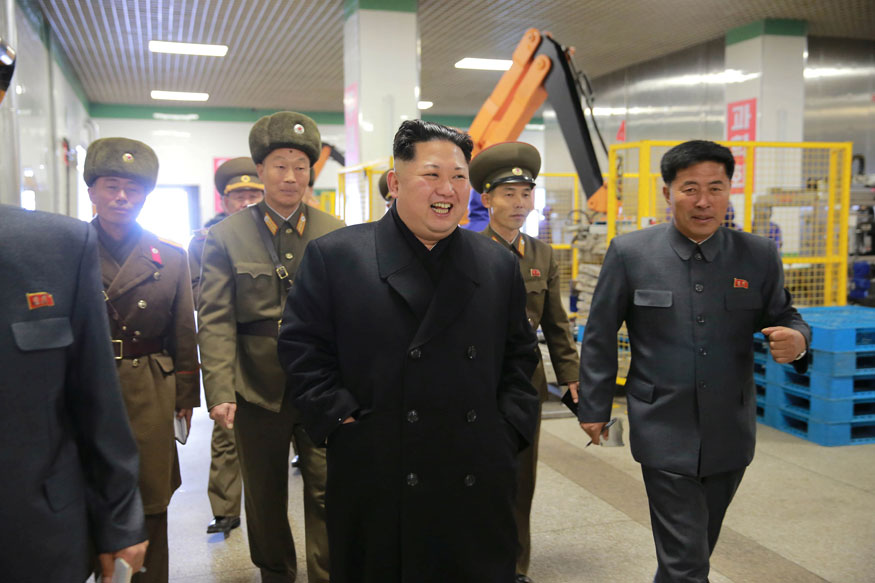SEOUL, Sept. 26 (Xinhua) -- The United Nations sanctions on the Democratic People's Republic of Korea (DPRK) over its nuclear and missile provocations would demonstrate effect within six months, a researcher of South Korea's state-run institute said Tuesday.
"The Resolution 2375 is much stronger than the previous ones. It will demonstrate its effect later this year or early next year," Park Jong-chul, a senior research fellow at the Korea Institute of National Unification (KINU), said at a function hosted by the Korea Trade-Investment Promotion Agency (KOTRA).
Previous sanctions, Park said, are mainly aimed to block the DPRK's development of weapons of mass destruction (WMD), but the new resolution included the ban on trade in goods of the DPRK's private sector.
On Sept. 3, Pyongyang detonated its sixth nuclear device, which was seen as the most powerful ever conducted by the Asian country.
The UN Security Council unanimously approved the resolution 2375 to toughen sanctions on the DPRK over its test of what it claimed was a hydrogen bomb that can be loaded on an intercontinental ballistic missile (ICBM).
The resolution curtails the DPRK's energy import, bans all of its textile export and prohibits further authorization of work permits abroad for DPRK workers.
Doubts have been raised over whether further sanctions on the DPRK could have any effect to encourage Pyongyang to return to a dialogue table. According to the Bank of Korea (BOK)'s estimate, the DPRK economy grew 3.9 percent in 2016.
The South Korean government under President Moon Jae-in maintained a basic principle of the two-track approach to the Korean Peninsula's nuclear issue: sanctions and pressure on the DPRK over its nuclear and missile provocations and seeking peaceful resolution to encourage Pyongyang to return to a dialogue table through the sanctions.
"The eventual goal of sanctions to achieve is dialogue," said the KINU researcher who believed that the government of South Korea was contemplating a peace road map on the Korean Peninsula through cooperation with the United States and China.
Moon has been widely forecast to inherit the Sunshine Policy, advocated by his liberal predecessors, of engagement with the DPRK through economic cooperation and the exchanges of sports, culture and personnel. It was sometimes called Moonshine Policy.
The South Korean leader repeatedly proposed to the DPRK participating in the South Korea-hosted Winter Olympics slated to be held in February next year at Pyeongchang in the country's west region, but Pyongyang has been mum about it.
The KINU researcher said South Korean people seemed not scared of the rising geopolitical risks on the peninsula as they place a full confidence in the current government's policy toward the DPRK.
Tensions ran high on the peninsula as the war of words was resumed between Pyongyang and Washington.
U.S. President Donald Trump said in his debut speech to the United Nations last week that his country would have no choice but to "totally destroy" the DPRK if Pyongyang continues to threaten the United States and its allies.
In response to the Trump's UN speech, top DPRK leader Kim Jong Un issued a rare statement to warn Washington of "the highest-level hardline countermeasure in history."
"Trump's rhetoric bomb," the researcher said, re-escalated tensions on the peninsula after the U.S. president's threat of "fire and fury" on Pyongyang.
Over the weekend, U.S. strategic bombers from the Pacific island of Guam and F-15C fighter escorts from Okinawa, Japan flew in international airspace over waters off the east coast of the DPRK.
Despite the geopolitical risks, a senior KOTRA official told reporters that the South Korean economy showed a better performance and maintained a healthy fundamental, saying the risks would have little impact on the economy.
According to the data provided by an official with the ninister of Trade, Industry and Energy, South Korea ranked 8th in the word in terms of trade volume, 9th in foreign exchange reserves and 11th in GDP. It also had a sovereign rating of AA, the third-highest tier in the measurement of global rating appraisers.
